ЖИВІ КАРТИНИ
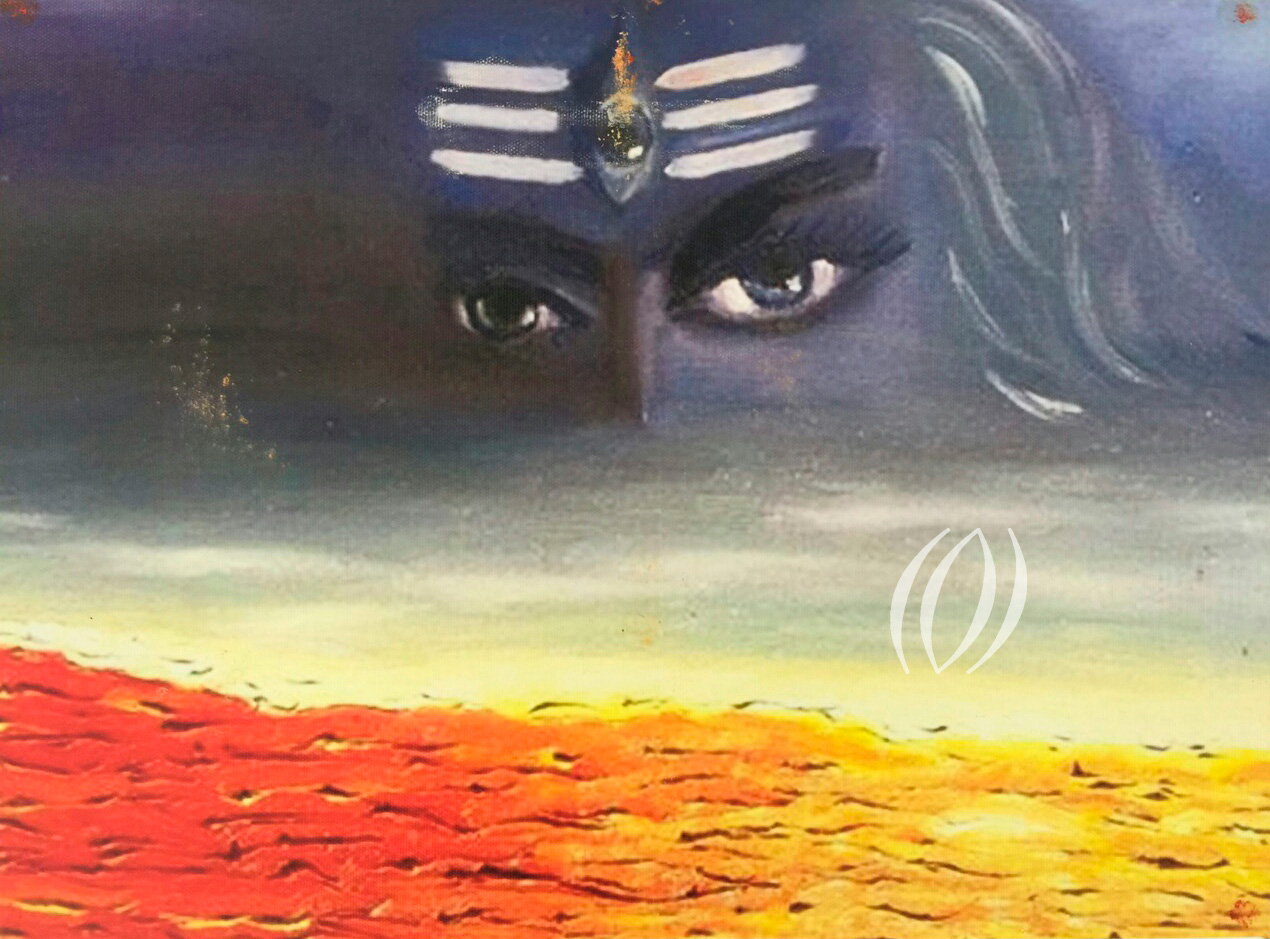
#1 Trinetraḥ
5D-art, live pictures, освячена фотокопія, 2015, 30x40 см, гелерейна натяжка
Ключове слово:
ПРОСВІТЛЕННЯ.
Форма Шиви з третім оком, Трінетра - уособлення вищої мудрості, всевидющої свідомості та сили трансформації.
🔱 Розширює сприйняття і допомагає пробудити інтуїцію.
🔱 Допомагає побачити суть явищ, вийти за межі матеріальних обмежень.
🔱 Очищає розум від страхів, прив'язаностей і его.
🔱 Дає сили для внутрішньої трансформації і подолання перешкод.
🔱 Нагадує про силу істини, яка завжди буде відкрита.
«Тільки через третє око можна побачити істину, яка прихована за зовнішніми оболонками світу».
Тріанетра - це не просто образ, це вікно у вищу реальність, яке допомагає трансформувати сприйняття світу і звільнитися від ілюзій.
Споглядання цього образу відкриває глибини розуміння, допомагає розпізнати істину навіть у найскладніших ситуаціях.
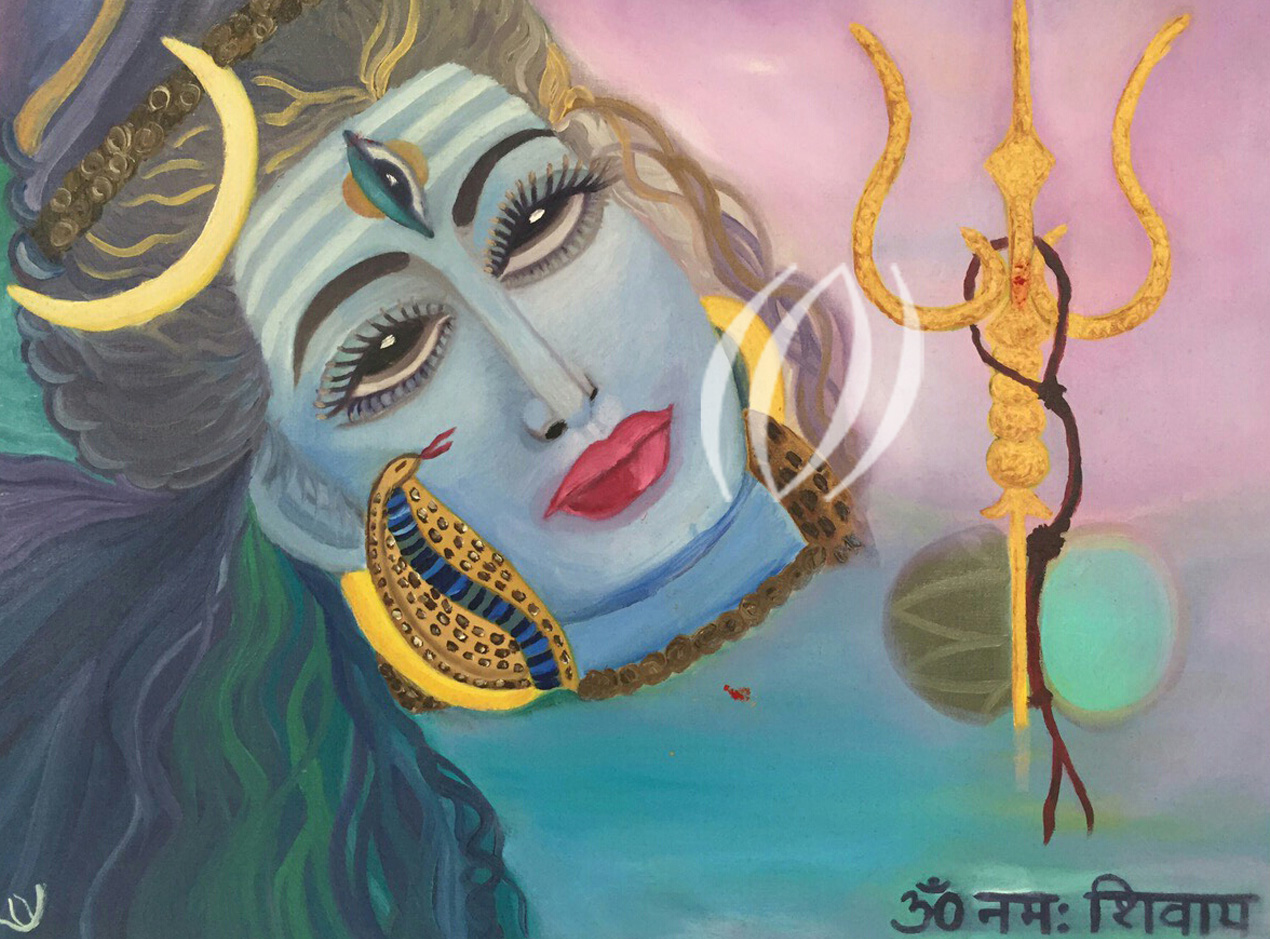
#2 Śivaḥ Śambhuḥ
5D-art, live pictures, полотно, олія, 2014, 40x50 см, гелерейна натяжка
Ключове слово:
ЩАСТЯ
Шіва Шамбгу (санскр. शिवः शम्भुः IAST (IAST Śivaḥ Śambhuḥ) - дарувальник добра, миру і внутрішнього блаженства.
Шамбхо означає «Щедрий», «Притулок радості» або «Той, хто дарує щастя».
В образі Шамбхо Шива проявляє себе як джерело найвищої радості, миру і любові до всього живого.
Саме Шива приносить милосердя, зцілення і гармонію. Господь Шива Шамбхо - «той, хто обіцяє вам блаженство».
🔱 Заспокоює розум і серце, допомагає зняти напругу і стрес.
🔱 Наповнює вас внутрішнім відчуттям радості та безпеки.
🔱 Допомагає відчути милість Всесвіту і власну причетність до нього.
🔱 Посилює практику вдячності, любові та прийняття.
🔱 Нагадує про стан найвищого блаженства, доступного кожному всередині.
🔱 У такому вигляді він очищає дім від несприятливих тонких енергій, заспокоює розум, розширює свідомість і знищує егоїзм.
🔱 Цей аспект Шиви розвиває творчі здібності, в тому числі літературні та художні.
«Я - джерело миру, розчинися в благодаті».
Це чудовий супутник для медитації, молитви чи просто споглядання, коли хочеться відчути внутрішній спокій і глибоку підтримку життя.
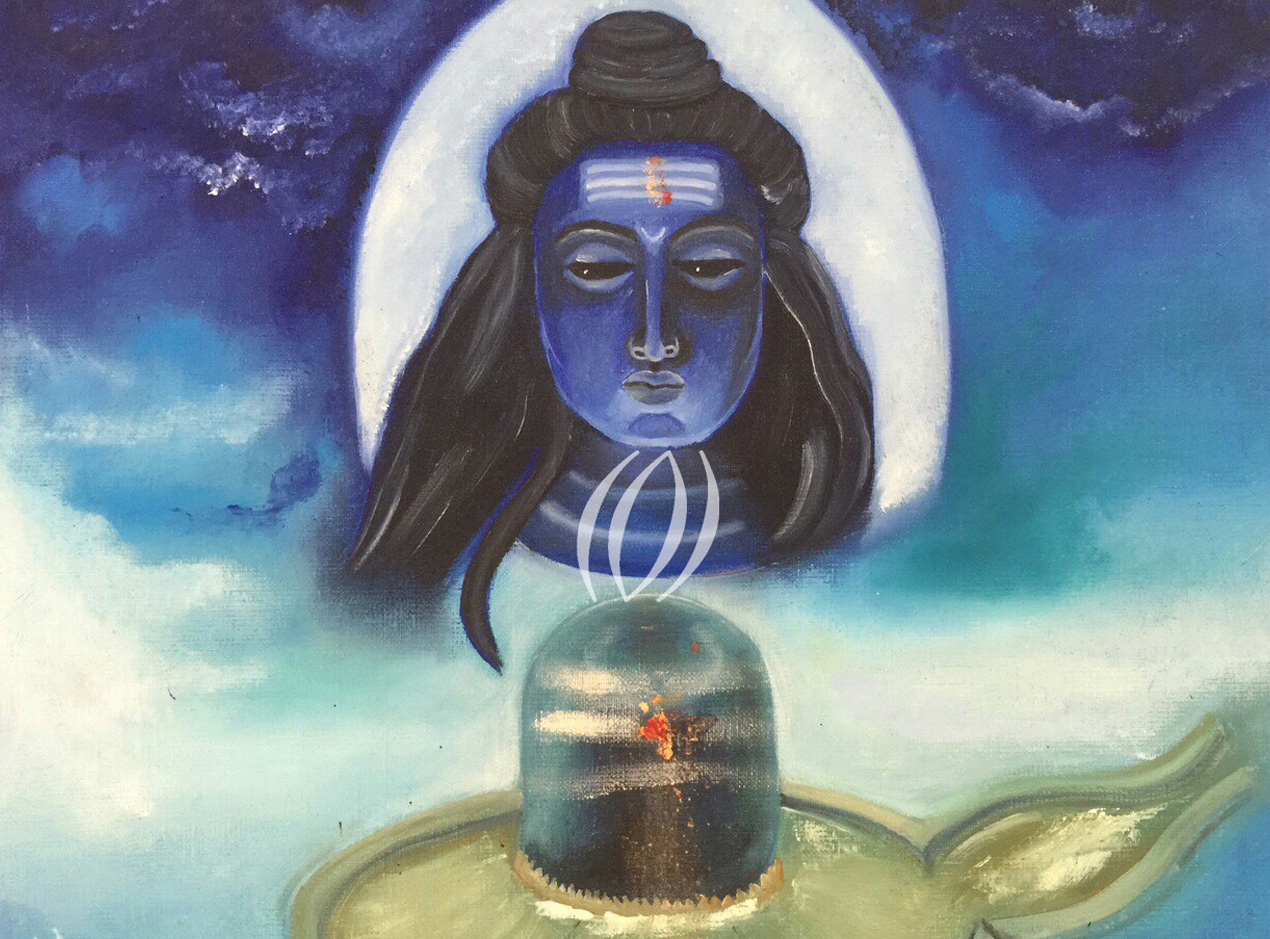
#3 Liṅgodbhavaḥ
5D-art, live pictures, полотно, олія, 2014, 30x40 см, гелерейна натяжка
Ключове слово: ВСЕСВІТ.
Це форма Шиви, що символізує його вічну і безмежну природу.
🔱 Допомагає відчути зв'язок з вищим, трансцендентним джерелом.
🔱 Розширює свідомість і дарує відчуття єдності з усім сущим.
🔱 Нагадує про справжню природу світу - поза формами та ілюзіями.
🔱 Допомагає вийти за межі его і розчинити страх смерті або втрати.
🔱 Заспокоює розум і налаштовує на глибоку медитацію та внутрішнє пізнання.
«Істина нескінченна, невидима для ока і сяє в кожному з нас як вічне світло».
Образ Лінгодбхави ідеально підходить для практики глибокого усвідомлення, медитації і розчинення в безмежному просторі свідомості.
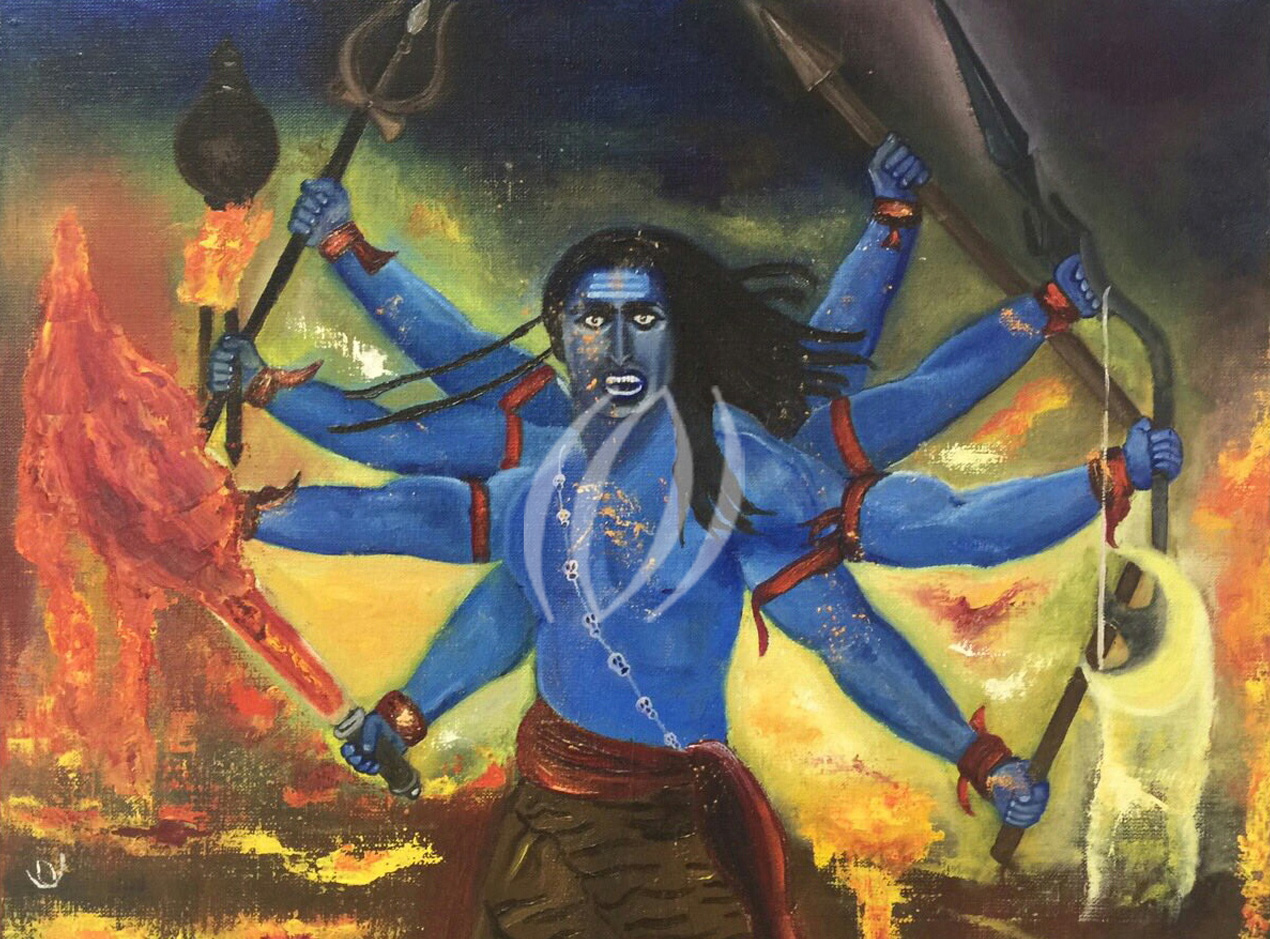
#4 Vīrabhadraḥ
5D-art, live pictures, полотно, олія, 2014, 40x50 см, гелерейна натяжка
Ключове слово: НЕПЕРЕМОЖНИЙ
Воїнський аспект Шиви, втілення божественної сили і справедливого гніву, Вірабхадра - потужний і грізний аспект Шиви, народжений з його гніву і печалі.
🔱 Надихає на силу духу і внутрішню стійкість.
🔱 Допомагає подолати страх, слабкість і внутрішніх ворогів.
🔱 Нагадує про здатність відстоювати правду і захищати справедливість.
🔱 Підтримує в часи випробувань і трансформацій.
🔱 Символізує перемогу над егоїзмом, гординею та ілюзіями.
«Не бійся випробувань - справжня сила всередині тебе, і вона чиста і справедлива».
Вірабхадра - це енергія активного захисту і дії, тому споглядання його образу заряджає рішучістю, додає сміливості,
допомагає рухатися вперед, не боячись змін і боротьби за правду.
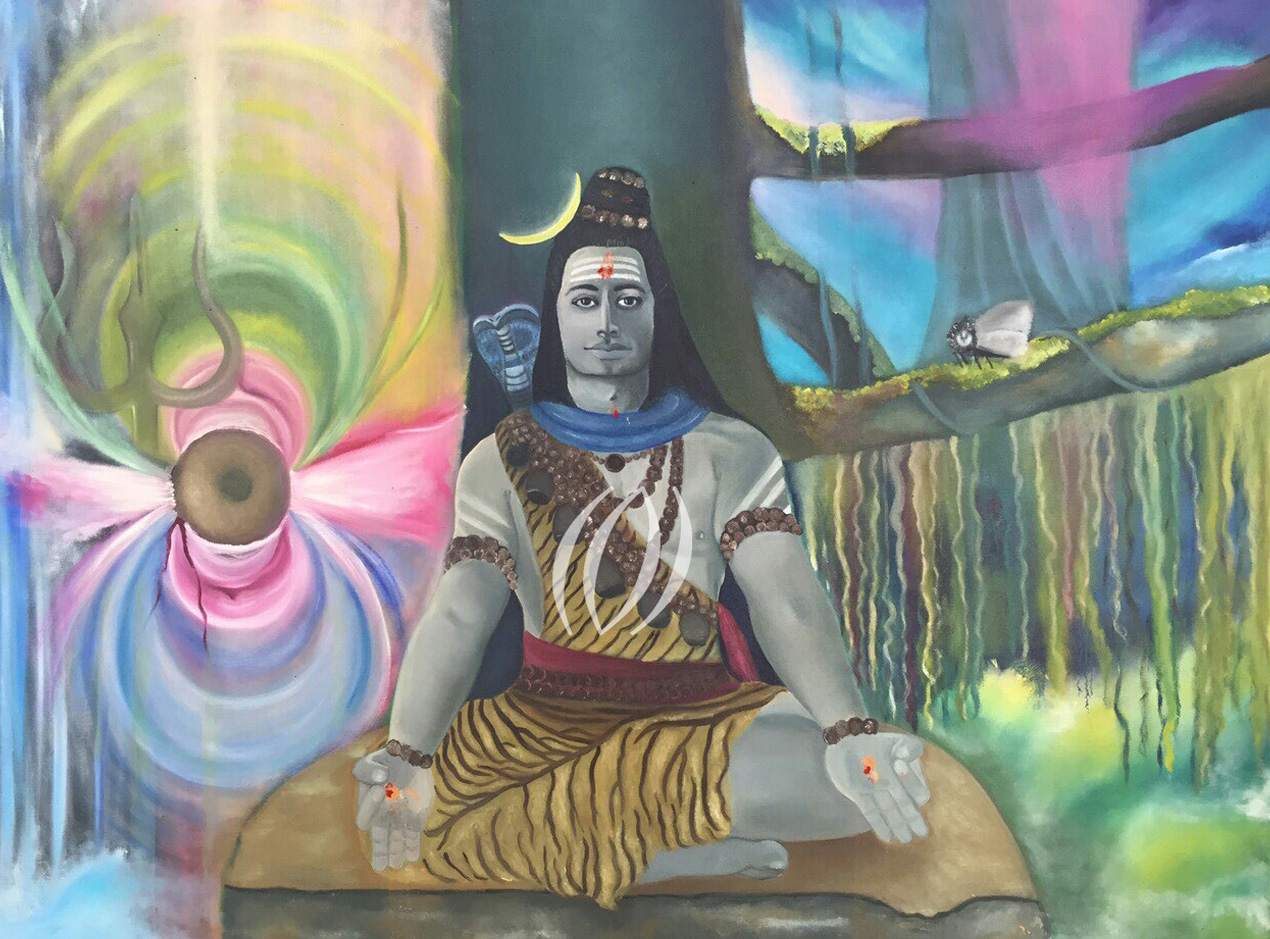
#5 Mahādeva-Yogeśvaraḥ
5D-art, live pictures, полотно, олія, 2015, 90x120 см, гелерейна натяжка
Ключове слово: ВОЛОДАР ЙОГИ.
Це аспект Шиви як Верховного Вчителя і Господа йоги. Ім'я Йогешвара означає «Володар йогів» або «Володар йоги».
🔱 Допомагає заглибитися в медитацію і внутрішню тишу.
🔱 Нагадує про силу самодисципліни та свідомого життя.
🔱 Надихає на духовний шлях і пошук істинного себе.
🔱 Допомагає подолати хаос думок, страхів і сумнівів.
🔱 Гармонізує енергії тіла і розуму, пробуджує внутрішню силу і спокій.
«Пізнай себе і ти пізнаєш весь всесвіт».
Цей образ особливо потужний для тих, хто шукає глибину, гармонію і силу на шляху особистісного і духовного розвитку.
Споглядання Йоґешвари відкриває доступ до внутрішнього джерела миру та мудрості.
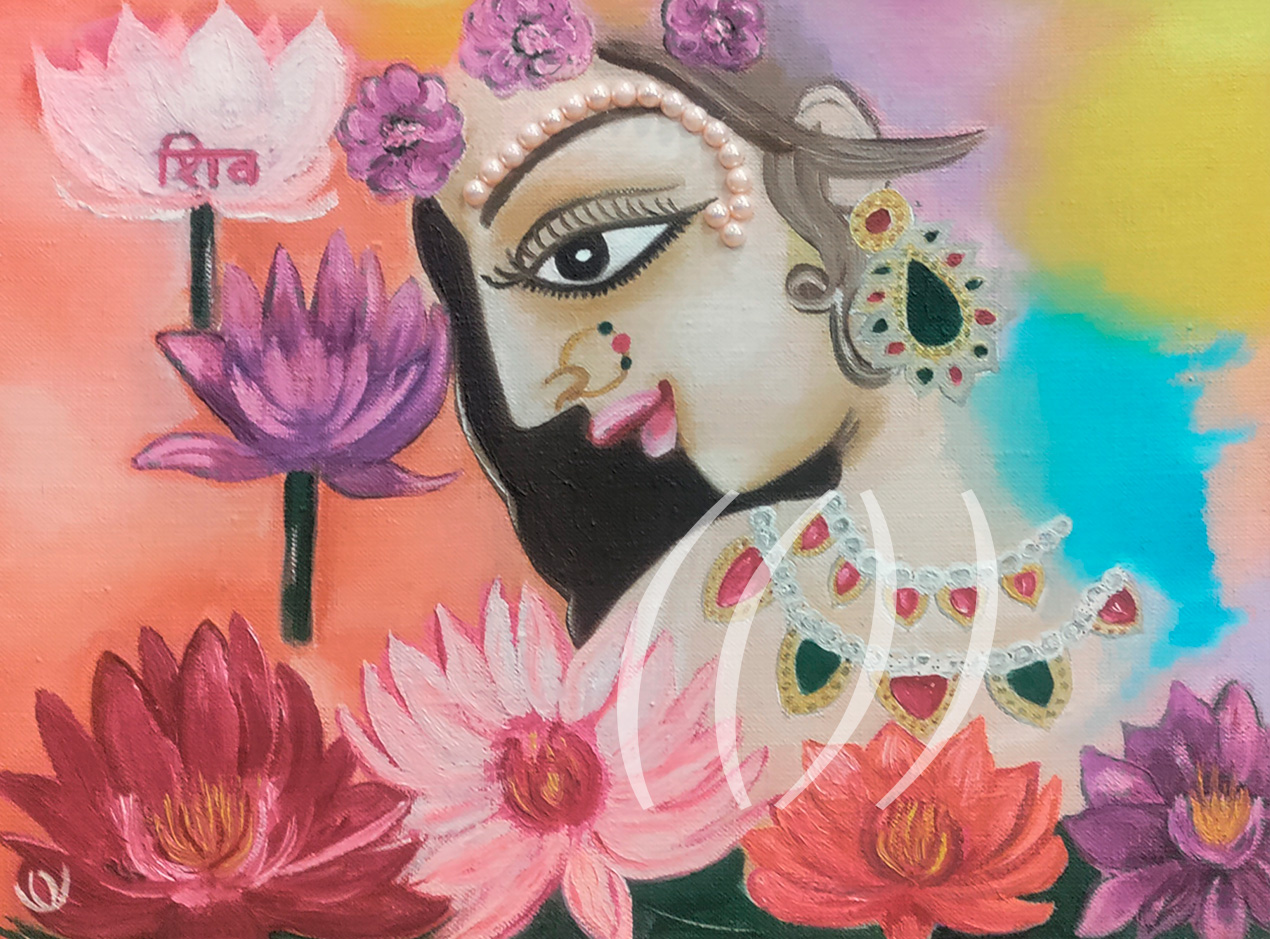
#6 Pārvatī
5D-art, live pictures, полотно, олія, 2014, 40x30 см, гелерейна натяжка
Ключове слово: ЖІНКА.
Парваті (санскр. पार्वती, IAST: pārvatī «гора») - аспект Шакті як втілення любові, ніжності та внутрішньої сили Парваті -
божественна дружина Шиви, уособлення жіночої енергії (Шакті), краси, чистоти та мудрості.
🔱 Дарує відчуття комфорту, захисту та любові.
🔱 Надихає на м'якість серця і силу духу водночас.
🔱 Допомагає відновити жіночу енергію, внутрішню гармонію і спокій.
🔱 Зміцнює віру в шлях розвитку і трансформації через любов і терпіння.
🔱 Нагадує про глибокий зв'язок людини з природою та її циклами.
🔱 Допомагає у створенні та зміцненні шлюбу.
🔱 Допомагає в зачатті дітей
«Справжня сила народжується з любові, ніжності і мудрості серця».
Вона символізує люблячу, турботливу і водночас сильну сторону природи, яка підтримує життя і веде до духовного зростання.
Парваті також уособлює шлях від звичайної людини до Богині, адже її історія - це шлях аскези, відданості та духовного пробудження.
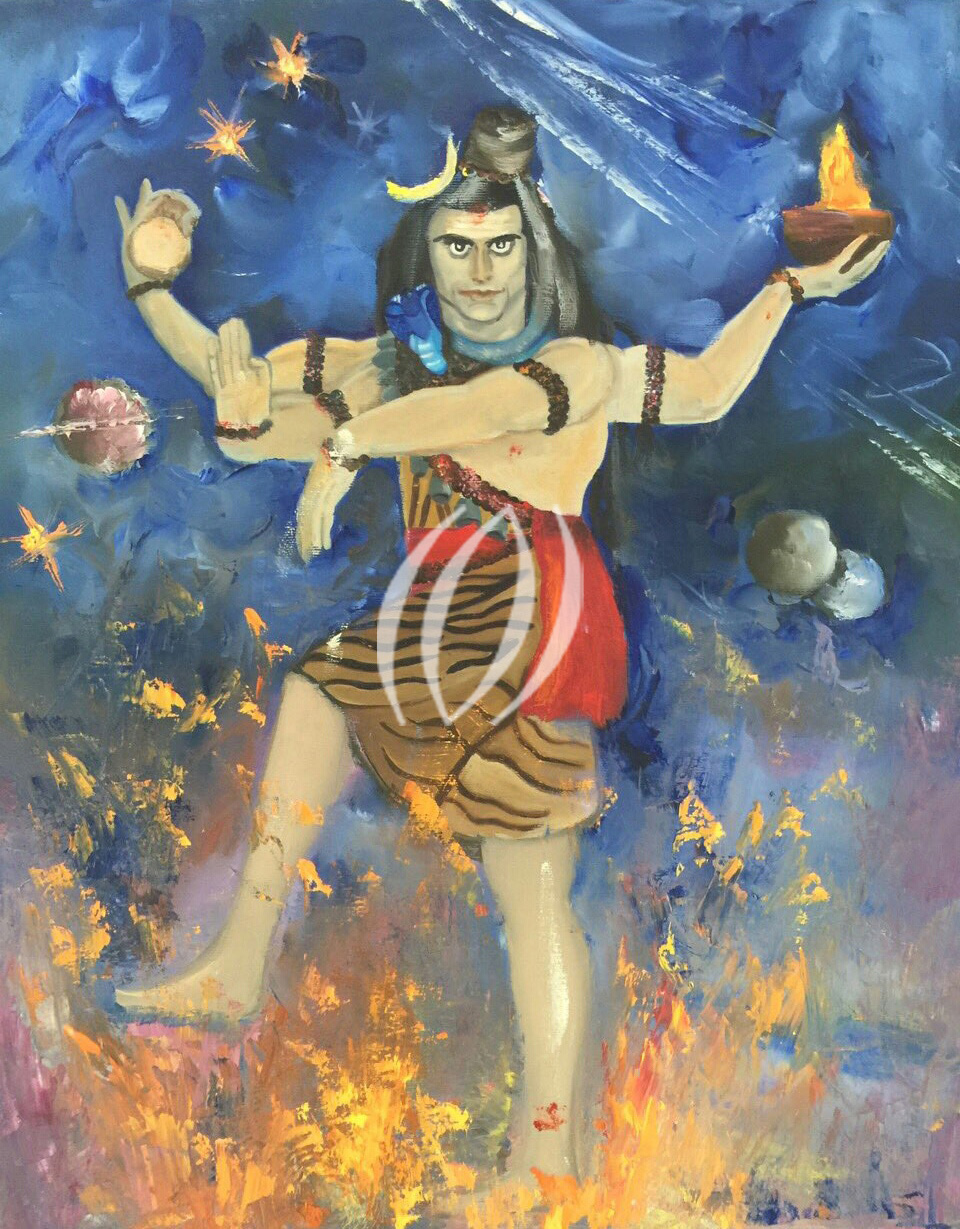
#7 Naṭarājaḥ
5D-art, live pictures, полотно, олія, 2015, 50x40 см, гелерейна натяжка
Ключове слово: БОЖЕСТВЕНИЙ ТАНОК.
Аспект Шиви як Космічного Танцюриста, Натараджа, означає «Цар Танцю».
У цій формі Шива постає як Повелитель Космічного Танцю (Тандава), танцю творення, збереження і руйнування Всесвіту.
🔱 Допомагає усвідомити циклічність життя і змін.
🔱 Надихає прийняти життя як божественну гру, танець.
🔱 Очищає розум від страху перед змінами і невідомістю.
🔱 Символізує перемогу знання над темрявою невігластва.
🔱 налаштовує на відчуття єдності з ритмом Всесвіту, пробуджує творчість і гнучкість.
«Все в цьому світі - це танець енергії і свідомості. Танцюй із Всесвітом".
Образ Натараджі дуже потужний для медитації на зміну, трансформацію і прийняття життя у всій його повноті.
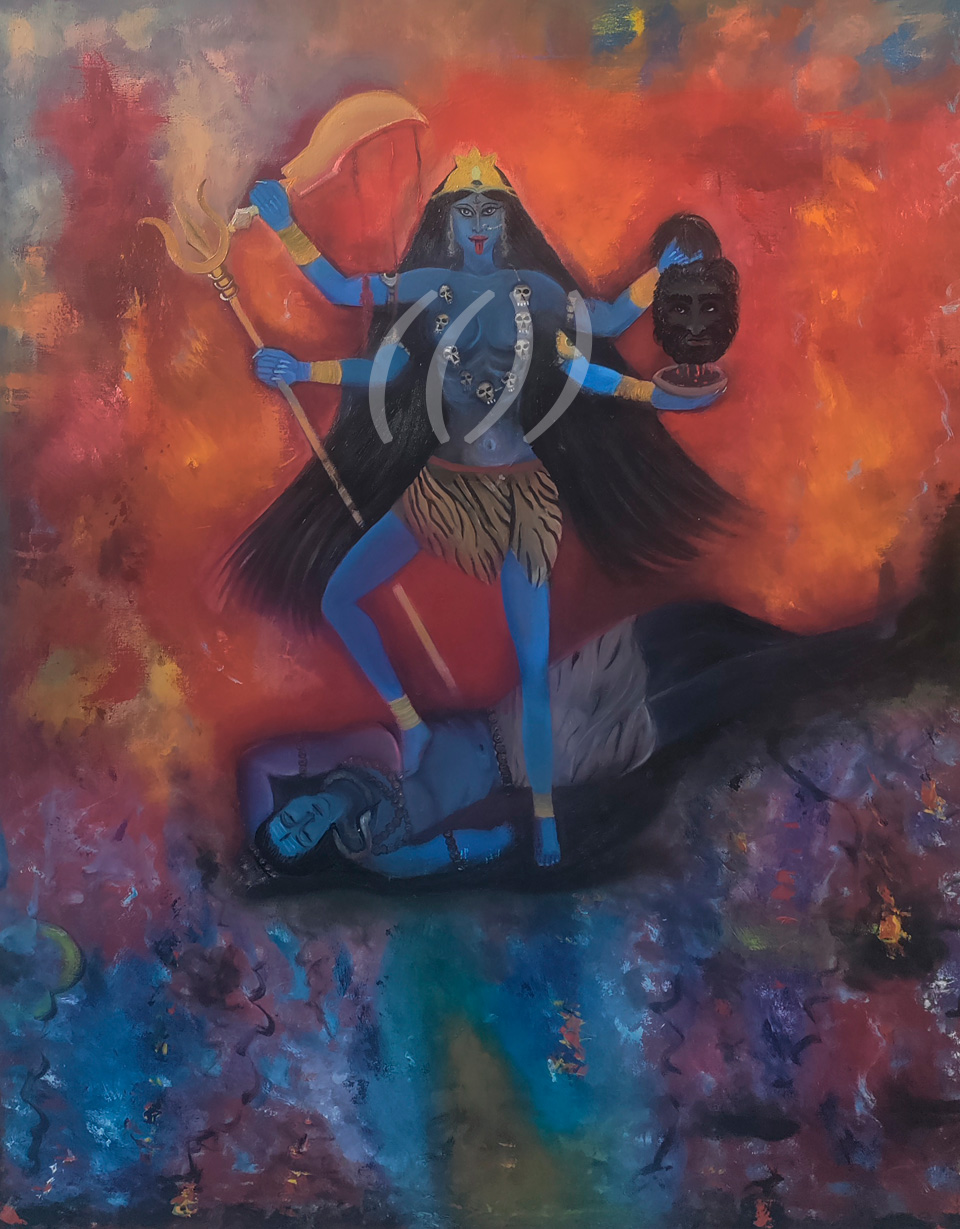
#8 Kālī
5D-art, live pictures, полотно, олія, 2015, 100x80 см, гелерейна натяжка
Ключове слово: ВІДРОДЖЕННЯ.
Калі, або Каліка, або Шьяма - аспект Шакті як богині часу, трансформації та руйнування ілюзій.
Калі - наймогутніший і найгрізніший аспект Шакті, уособлення часу, смерті, трансформації та очищення.
Вона руйнує все ілюзорне, знищує его, страхи і прив'язаності, ведучи душу до звільнення.
Її зовнішність може здатися страхітливою: темна шкіра, намисто з черепів, меч і відрубані голови -
все це символи звільнення від ілюзій і перемоги над смертю. Калі - це темна, непізнавана енергія, яка руйнує, щоб народити нове.
Це нескінченний простір змін і відродження.
🔱 Допомагає позбутися страхів, сумнівів і внутрішніх обмежень.
🔱 Нагадує про швидкоплинність життя і пробуджує силу жити тут і зараз.
🔱 Підтримує у важкі моменти трансформації, змін і втрат.
🔱 Допомагає подолати его і прийняти правду про себе і світ.
🔱 Дає відчуття захисту і сили, особливо в боротьбі з внутрішніми ворогами.
"Щоб народитися знову, потрібно померти для ілюзій. Я очищаю себе і стаю вільною".
Тріанетра - це не просто образ, це вікно у вищу реальність, яке допомагає трансформувати сприйняття світу і звільнитися від ілюзій.
Споглядання цього образу відкриває глибини розуміння, допомагає розпізнати істину навіть у найскладніших ситуаціях.
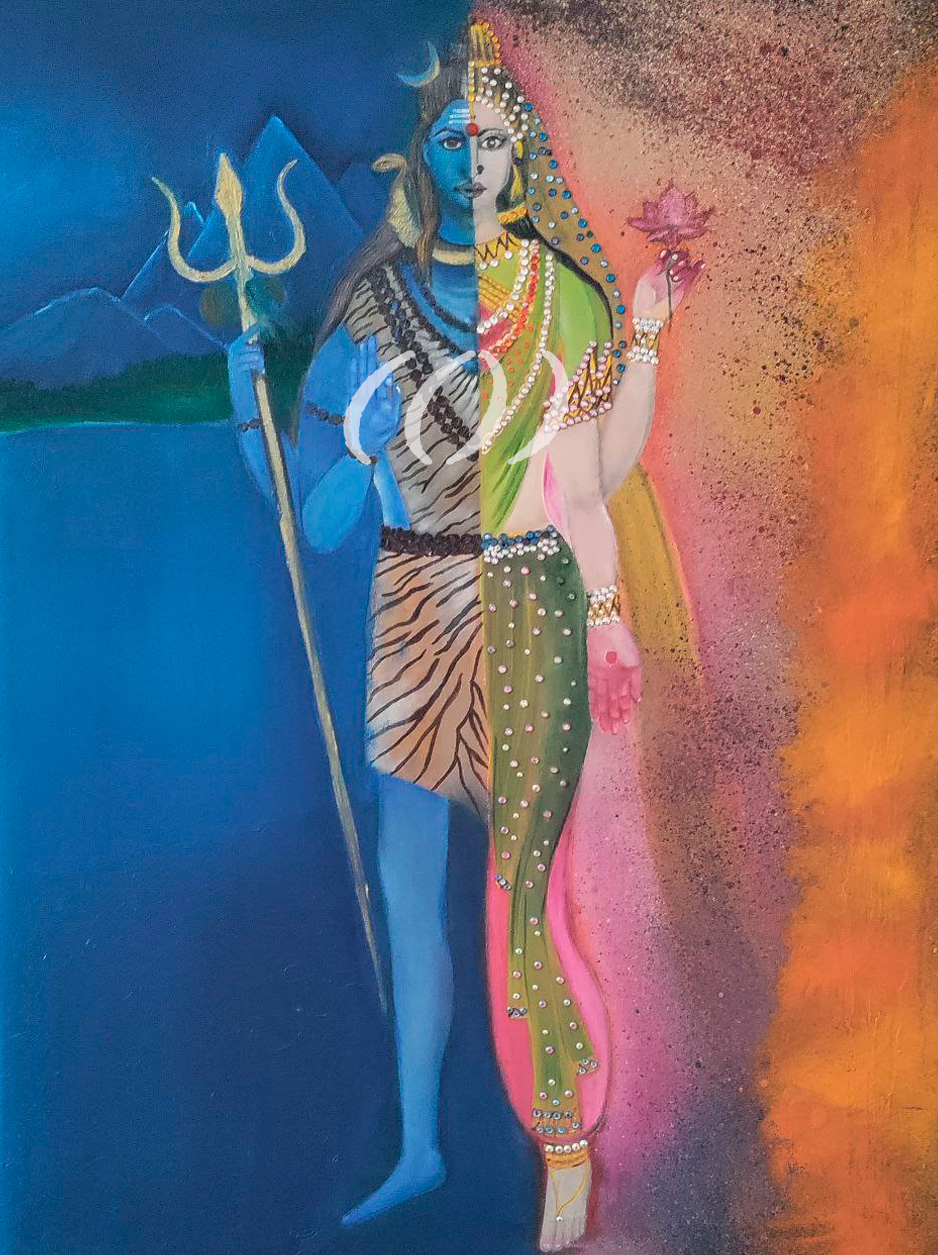
#9 Ardhānārīśvaraḥ
5D-art, live pictures, полотно, олія, swarovsky, 2015, 80x60 см, гелерейна натяжка
Ключове слово: СИНЕРГІЯ.
Ардханарішвара, аспект Шиви як єдності чоловічого і жіночого, означає «Господь, який наполовину є жінкою».
У цій формі Шива постає у злитті зі своєю Шакті, Парваті, демонструючи повну гармонію чоловічої та жіночої енергії, свідомості та матерії,
статики та динаміки. Одна половина зображення - Шива, інша - Парваті.
Це втілення ідеї про те, що все складається з двох начал, які не протистоять, а доповнюють одне одного.
🔱 Допомагає знайти внутрішній баланс між активністю та спокоєм, логікою та інтуїцією.
🔱 Гармонізує чоловічу та жіночу енергію в людині.
🔱 Дарує відчуття цілісності та самоприйняття.
🔱 Надихає на глибше розуміння єдності протилежностей у житті.
🔱 Підтримує в пошуку гармонії у відносинах і з навколишнім світом.
«Тільки в єдності двох начал народжується справжнє життя і цілісність буття».